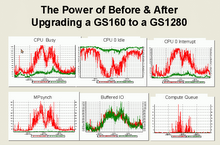Bootcamp attendees were able to see and hear examples of different ways of applying a T4 approach to their particular performance problems.
Here's a list some highlights of these two sessions. If you would like more information about any of these topics, you can contact me here.
- Pat McConnell demonstrated how easy it is to install T4 and get it up and running
- Kevin Jenkins walked us through a series of challenging examples and showed us how he uses TLViz to dig into the toughest problems.
- Tom Cafarella gave us an update on the latest developments with T4 V4.2
- Melanie Hubbard brought us up to date on the latest developments with OTLT - the Oracle Time Line Tool including how to acquire the most recent version from Oracle Metalink
- Bart Lederman shared his system manager experience of putting T4 into practice in a very large computer center with literally dozens of OpenVMS systems. He focused on how he step by step augmented the out of the box capabilities of T4 by customizing the DCL scripts, adding automation to avoid repeating the same steps on each system, and adding a series of very useful new T4-style collectors.
- John Fisher illustrated how he used the most advanced features of both TLViz and CSVPNG to tackle really complex problems involving OpenVMS and EVA storage.
- Steve Lieman presented on the latest improvements to TLViz and CSVPNG and how these are focused on saving our time.
- While we ran out of time to present it, BootCamp attendees were able to download a copy of Pat McConnell's excellent presentation showing what is required to create new T4-style CSV files that will work well with TLViz and CSVPNG.
The first main thought that came across to me after watching all these individual segments (not to mention the additional material from the special T4 projects workshop) was the ease at which the T4 universe of tools could be readily adopted to the strengths and interests of the person using these tools and the type of problem they are trying to solve.
Each person's approach was both different and effective. I am hoping that those attending the bootcamp were able to come away with a number of new ideas for a mix of styles that they can add to their personal T4 repertoire.
The second major thought from watching all these different approaches was that in each case, the T4 tool set had directly unlocked significant time-savings for doing the performance work at hand. This of course is consistent with the design center for the T4 approach which has always been and still remains focused on saving our time. T4 always treats our time as the scarcest, most precious resource.



No comments:
Post a Comment